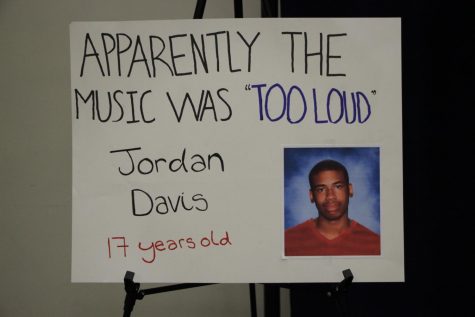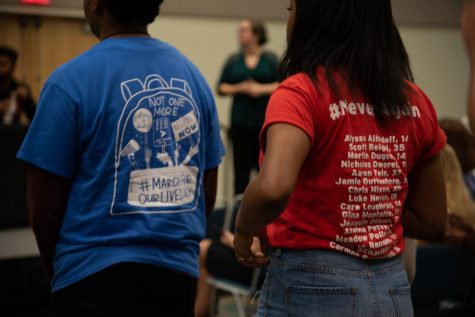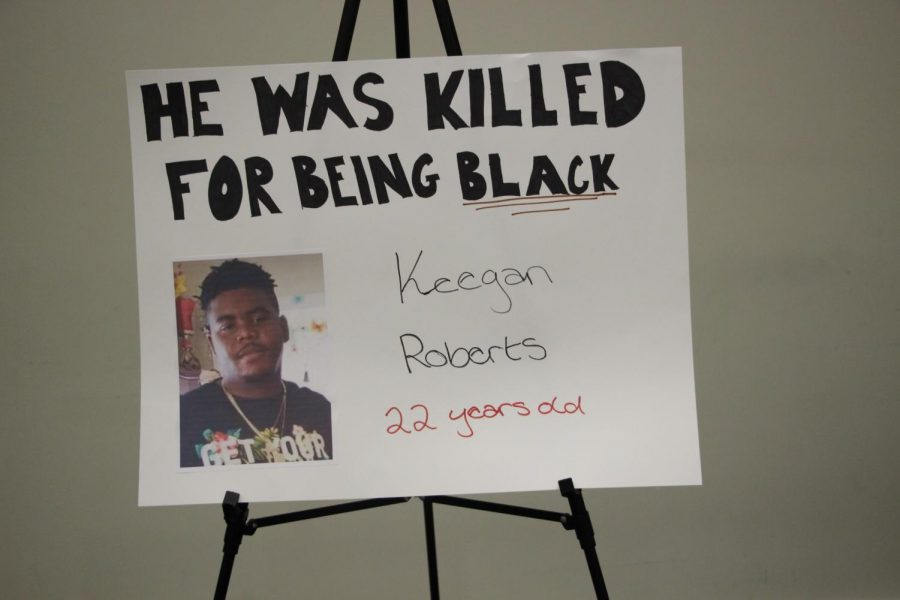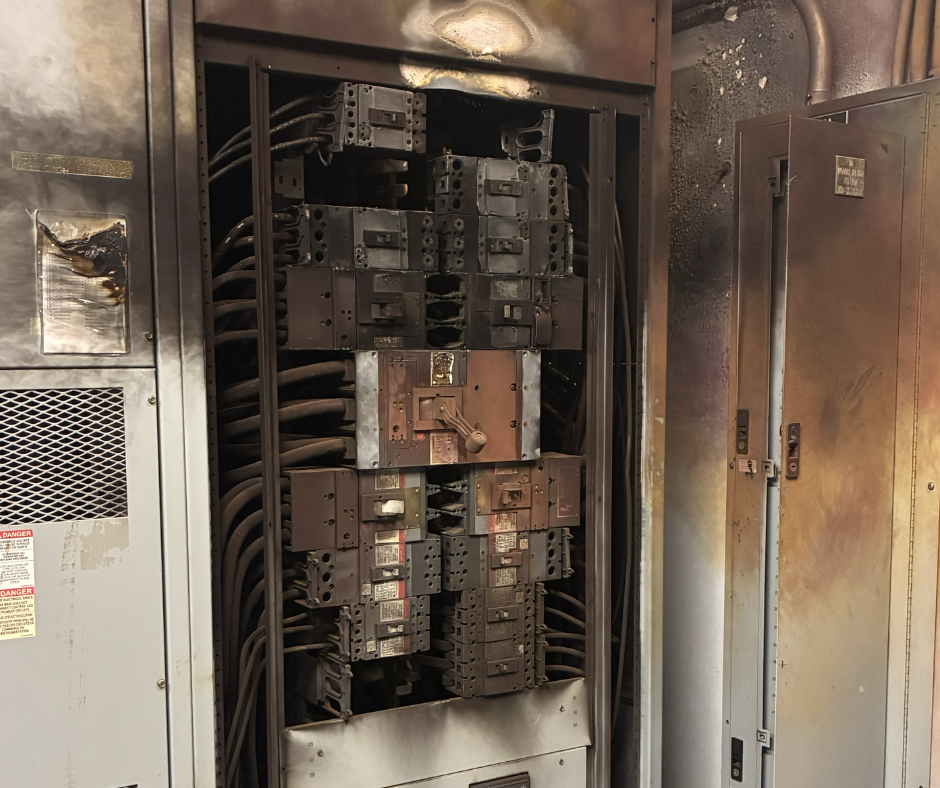After 17 of their classmates and teachers were murdered in the Parkland mass shooting on Feb. 14, survivors and recent graduates of Marjory Stoneman Douglas High School decided to take the gun control debate into their own hands. By June 2018, only four months after a former student entered their halls with an AR-15, several Parkland students took to the road to start the “Road To Change” tour, an extension of the previous March for Our Lives rally.
Finally, on Friday, July 27, these Parkland students, as well as other victims of gun violence, took the podium at UNF for the Road to Change Jax: Town Hall forum on gun safety and violence.

From left to right: Ron Davis Father of Jordan Davis, Vincente Waugh, Dequan Franks, Danielle Williams, Monique Samson, Kaelan Kindy, Xavier Gould, Aaliyah Eastman, Sofie Whitney, Maxwell Frost
on the Road to Change panel.
Prior to the start of the event, Mariana Jimenez, a recent graduate of Marjory Stoneman Douglas and current UNF student, shared her experience of the shooting with Spinnaker.
“After [the shooting], we realized, if it could happen at Parkland, it could happen anywhere. It was like a barrier was just broken down,” she recalled.
Adam Alhanti, another survivor of the shooting, sat down with the Spinnaker to discuss the purpose of the forum in greater depth.
“We’ve seen in the past that arguments are how people speak about politics and it’s not the way anymore. Now, it’s based on open-ended discussion and talking with people who might not agree with you,” he explained. “The people who think we’re trying to grab everyone’s guns, they’ve said we’re grabbing guns and we’re taking everyone’s AR-15s and that’s not true. Everyone says ‘gun control,’ and that’s not what we’re here to do. We’re not trying to lock everyone down. What we’re trying to do is gun violence prevention.”
With 10 panelists in total, the forum began with formal introductions and 12 predetermined questions, which was followed by questions asked by audience attendees. In taking turns answering the various questions, the panelists’ answers encompassed gun violence as it pertained to the education system, urban communities, the LGBTQ community and the country as a whole.
“96 people a day die from gun violence,” Orlando panelist Maxwell Frost affirmed, regarding the issue of gun partisanship and community collaboration. “This isn’t a Democrat issue. This isn’t a Republican issue. This is an American issue… The people who make this a partisan issue are the politicians who go and vote, not the survivors.”
Other topics involved Florida legislation and gun policies, such as the “Stand Your Ground” law.
Ron Davis, father to Jordan Davis who was murdered for allegedly “playing music too loud” in 2012, stated that he supports the repeal of such a law.

Jordan Davis was murdered on Nov. 23, 2012, in Jacksonville, Florida.
“Ask [others]: do they know that, under the ‘Stand Your Ground’ statute, that if you and your family are coming out of movie theater minding your own business and two people are out their ‘standing their ground,’ if your loved one or your child gets hit by that bullet, it’s collateral damage?” Davis explained to the attendees. “If nothing else, understand that it could affect you, even if you’re minding your own business. That’s how little they care about your lives.”
On the topic of gun training and mental health activism in school campuses, UNF student and rising teacher in the community, Monique Sampson, discussed her personal experience and how it has shaped her opinion.
“I have gone through gun education, as I have experienced domestic violence,” she explained. “This is something that you can’t play with, and it should be talked about with kids.”
She also conveyed her belief that, as different students face different cognitive problems and expressions, such training would need to be individualized. Overall, however, she felt strongly regarding public institutions being a place of safety for the children and faculty who reside there on a daily basis.
“School is a safe haven for a lot of people, and we don’t need to take away safe havens from urban communities,” Sampson said.
But not everybody in attendance was in full support of stricter gun laws.
Members of Article 6, a Florida group that seeks to “preserve the foundation America, was built upon and ensures that the Rights of all Americans are protected from all enemies foreign and domestic,” came to the event and discussed some of their views with the Spinnaker.
“Just to be clear, every one of us weeps over lost lives, especially children, but we don’t see crime out of law-abiding citizens,” Article 6 Florida co-coordinator, Ken Rucker, said. “The people that are criminals don’t obey the gun laws anyways.”
“The first 90 seconds is the most critical time between you and the perpetrator. The average police response time in the United States is nine to eleven minutes,” Ken Morrow Jr., another member of the Article 6 team, said. “What happens in that time between the 90 seconds and the nine to eleven minutes is that it’s up to you to protect yourself and, if you can’t, as opposed to the police coming to help you out, they’re coming with a body bag.”

Two activists wear shirts in support of March for Our Lives and Marjory Stoneman Douglas
In all, by the end of the forum, the panelists and activists simply encouraged all attendees to commit to action and change. According to the speakers, the youth voter registration in Florida has increased by 41 percent since the shooting. However, for them, it doesn’t end there.
“Don’t let the conversation stay in this room. It’s about morality and it’s about lives and it’s about humans,” Parkland survivor Sofie Whitney said. “Age doesn’t matter. No matter how young you are, how old you are you can make a difference. Look at us: there are kids all across the country mobilizing. We have been ignored for so long and adults have treated us as if we are lesser. But I think that all of us being here tonight and talking about serious things shows that we are capable, and we need to be listened to.”
—
For more information or news tips, or if you see an error in this story or have any compliments or concerns, contact editor@unfspinnaker.com.


















crystal a moore | Jul 28, 2018 at 10:57 am
A comma goes a long way.
Sissi j. Shepard | Jul 28, 2018 at 2:00 am
My son Keegan Von Roberts was killed by Michael centanni IV who now says stand your ground Melissa Nelson the state attorney says there was not enough evidence to charge him even for one night ..all of these matters are of concern when it is gun violence or not..Lets not forget.. Kendrick Johnson who was not gun violence but let’s not forget him he was beaten in Georgia and rolled up in a mat and his organs missing Jordan Davis Trayvon Martin so many other cases I could go on and on but all lives matter the transgender people who have been getting murdered someone knows something Maurice Hobbs are any of these cases going to be solved or do they just not care …….Jacksonville through the years it’s been very quiet as if people are afraid to speak it’s time to speak up people these are our children ..we need to get Justice for our families.. I appreciate all the hard work that you all do ..you’re all awesome God love you ..there’s no room for hate there’s no room for bitterness but there is room to be direct stand solid stand strong and keep it real love you all